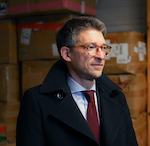
The time for sustainable growth has begun
The environmental transition is urgent. Global warming, the degradation of our environment and the resulting loss of biodiversity are all issues that require strong and rapid action in all sectors of our economy.
Firstly, we will have to develop new renewable energy production units (wind turbines, solar panels, geothermal energy, etc.) and connect them via a large pan-European intelligent network. At the same time, our buildings will have to be renovated to save energy. We also need to develop our rail and public transport networks. The layout of our towns and cities will continue to be reviewed to encourage soft and collective mobility. All this infrastructure work, as well as the maintenance and operation of these networks, will create economic activities with many local jobs that cannot be relocated.
Secondly, the transition to a more sustainable society implies a green reindustrialisation of Europe. We have suffered massive company relocations over the last few decades. We are witnessing a race to the bottom to go and produce where production costs are lowest, i.e. where workers are paid the least and where environmental standards are the lowest. Relocating our industry will enable us to consume products that meet the highest environmental standards, will reduce emissions linked to the transport of goods and will also create economic activities with many jobs at stake.
I particularly want to emphasise that the Due Diligence Directive is an important step in this direction, as it will make companies accountable throughout their production chain, with regard to both human rights and the environment. This will make Europe more competitive and combat social and environmental dumping.
Thirdly, our economy cannot be sustainable unless it is circular. We need to make our production chains circular in order to reduce our need for raw materials and cut our waste production. The recycling and reuse of goods sector will therefore have to develop throughout Europe, which will once again create economic activity and a large number of jobs.
So it seems that the transition to a more sustainable society could be a vehicle for creating wealth and jobs. In addition, this transition will strengthen the resilience of our economy by reducing Europe’s dependence on imported energy, raw materials and manufactured goods. These are the objectives pursued by the European Green Deal, and we broadly support these policies.
Unfortunately, it is uncertain whether growth can be maintained in the long term solely by developing the sustainable sectors mentioned above. We live in an increasingly uncertain world with a deregulated climate, fragile ecosystems and critical natural resources that are becoming increasingly scarce. These planetary limits lead to a tense geopolitical context that encourages the emergence of frequent crises and hinders economic development, as we have seen recently with the chain of events that followed the coronavirus pandemic and the war in Ukraine.
Furthermore, economic growth is not synonymous with public well-being or prosperity. Many of the items of expenditure included in GDP are harmful or pointless from a societal point of view. What’s more, this indicator does not provide a satisfactory measure of inequality, job quality, access to goods and knowledge or the quality of the environment.
This is why we should not be focusing on the dual objective of economic growth and environmental protection embodied in the term “green growth”, but rather on the combination of public well-being and environmental protection.
We should therefore focus more on indicators of well-being rather than GDP, and develop policies that improve people’s quality of life in an economy in full transition.
First of all it is essential to modernise and strengthen our social security system to offer workers better protection in the face of the economic transformations linked to transition. Secondly, collective reductions in working time will improve the well-being of workers while increasing the employment rate without requiring economic growth. Thirdly, to achieve this, we need to make our companies more accountable and democratic, and we could also mention numerous measures such as the development of the commons, which will make it possible to build a more resilient and protective economic model in a context of transition.
All these transition and support policies will have to be financed by a broader and fairer tax system based more on capital and other tax levies such as a tax on financial transactions to ensure that revenues are sufficient and as stable as possible.
These measures will not be part of a logic of green growth or degrowth, but will support the environmental transition, strengthen the resilience of our economy and help cushion the shocks we face. In this way, our citizens will be able to move forward serenely in a rapidly changing world.




